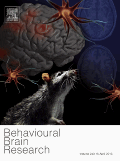 Melissa Loria and other members of Dr. Ken Sufka’s laboratory group have just had a manuscript accepted for publication in the journal Behavioral Brain Research. The citation and abstract are as follows:
Melissa Loria and other members of Dr. Ken Sufka’s laboratory group have just had a manuscript accepted for publication in the journal Behavioral Brain Research. The citation and abstract are as follows:
“Brain-derived neurotrophic factor in vulnerable and resilient genetic lines in the chick anxiety-depression model”
Loria ML, White SW, Robbins SA, Salmeto AL, Hymel KA, Murthy SN, Manda P, Sufka KJ
ABSTRACT
Altered BDNF-mediated synaptogenesis is a major contributor to stress-vulnerability and depression. This study sought to determine patterns of hippocampal BDNF expression in stress-vulnerable and -resilient strains in the chick anxiety-depression model. Socially raised Black Australorp and Production Red strains were tested at 5-6 days post hatch under either 30, 60, 90, or 120 min of social separation stress; chicks tested with 2 social companions for 120 min served as a controls. Distress vocalizations were recorded throughout the test session and latency to behavioral despair calculated. Following tests, bilateral hippocampal sections were harvested and analyzed via ELISA for BDNF levels. Black Australorps had shorter latencies to behavioral despair than Production Reds reflecting greater stress vulnerability. No differences were detected in BDNF levels between a No-Test and Social group within or between strains. The stress resilient Production Reds showed stable BDNF levels across the isolation test period whereas the vulnerable Black Australorps showed an increase in hippocampal BDNF levels that peaked at 90 min and declined thereafter. These findings fit well with the notion that strain-dependent stress-vulnerability reflects, in part, poor homeostatic mechanisms controlling synaptogenesis.

